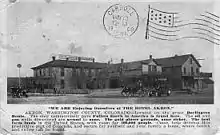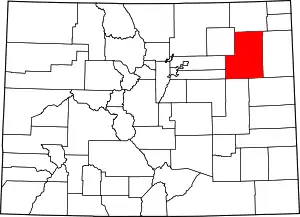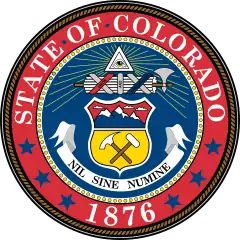Akron, Colorado
Akron is the Statutory Town that is the county seat and the most populous municipality of Washington County, Colorado, United States.[3][9] The town population was 1,702 at the 2010 United States Census.[10]
Akron, Colorado | |
|---|---|
Statutory Town | |
 Entering Akron from the east. | |
 Location of Akron in Washington County, Colorado. | |
| Coordinates: 40°09′52″N 103°13′14″W[1] | |
| Country | United States |
| State | Colorado |
| County[2] | Washington County - seat[3] |
| Incorporated | 1887-09-22[4] |
| Government | |
| • Type | Statutory Town[2] |
| Area | |
| • Total | 2.77 sq mi (7.18 km2) |
| • Land | 2.77 sq mi (7.18 km2) |
| • Water | 0.00 sq mi (0.00 km2) |
| Elevation | 4,659 ft (1,420 m) |
| Population (2010) | |
| • Total | 1,702 |
| • Estimate (2019)[7] | 1,723 |
| • Density | 621.57/sq mi (239.97/km2) |
| Time zone | UTC-7 (MST) |
| • Summer (DST) | UTC-6 (MDT) |
| ZIP code | 80720[8] |
| Area code(s) | 970 |
| FIPS code | 08-00925 |
| GNIS feature ID | 0182984 |
| Highways | US 34, SH 63 |
| Website | Town of Akron |
History
Akron was platted in 1882.[11] The community was named after Akron, Ohio, the native home of the wife of a railroad employee.[12] The town was incorporated in 1887.[13]
Geography
Akron is located at 40°9′42″N 103°12′43″W (40.161530, -103.211850),[14] at the intersection of U.S. Highway 34 and State Highway 63.
According to the United States Census Bureau, the town has a total area of 1.5 square miles (3.9 km2), all of it land.

Demographics
| Historical population | |||
|---|---|---|---|
| Census | Pop. | %± | |
| 1890 | 559 | — | |
| 1900 | 351 | −37.2% | |
| 1910 | 647 | 84.3% | |
| 1920 | 1,401 | 116.5% | |
| 1930 | 1,135 | −19.0% | |
| 1940 | 1,417 | 24.8% | |
| 1950 | 1,605 | 13.3% | |
| 1960 | 1,890 | 17.8% | |
| 1970 | 1,775 | −6.1% | |
| 1980 | 1,716 | −3.3% | |
| 1990 | 1,599 | −6.8% | |
| 2000 | 1,711 | 7.0% | |
| 2010 | 1,702 | −0.5% | |
| 2019 (est.) | 1,723 | [7] | 1.2% |
| U.S. Decennial Census[15] | |||
At the 2000 census there were 1,711 people in 734 households, including 457 families, in the town. The population density was 1,179.3 people per square mile (455.6/km2). There were 835 housing units at an average density of 575.5 per square mile (222.3/km2). The racial makeup of the town was 93.51% White, 0.12% African American, 1.23% Native American, 0.12% Asian, 0.06% Pacific Islander, 4.32% from other races, and 0.64% from two or more races. Hispanic or Latino of any race were 11.75%.[16]
Of the 734 households 29.3% had children under the age of 18 living with them, 50.8% were married couples living together, 9.4% had a female householder with no spouse present, and 37.7% were non-families. 33.8% of households were one person and 16.8% were one person aged 65 or older. The average household size was 2.28 and the average family size was 2.94.
The age distribution was 26.2% under the age of 18, 6.3% from 18 to 24, 23.4% from 25 to 44, 21.0% from 45 to 64, and 23.1% 65 or older. The median age was 40 years. For every 100 females, there were 97.3 males. For every 100 females age 18 and over, there were 89.8 males.
The median household income was $29,420 and the median family income was $35,156. Males had a median income of $25,875 versus $21,000 for females. The per capita income for the town was $15,772. About 8.1% of families and 11.0% of the population were below the poverty line, including 13.9% of those under age 18 and 11.3% of those age 65 or over.
Climate
Akron experiences a semi-arid climate (Köppen BSk) with cold, dry winters and hot, dry summers.[17]
| Climate data for Akron, Colorado | |||||||||||||
|---|---|---|---|---|---|---|---|---|---|---|---|---|---|
| Month | Jan | Feb | Mar | Apr | May | Jun | Jul | Aug | Sep | Oct | Nov | Dec | Year |
| Record high °F (°C) | 74 (23) |
77 (25) |
85 (29) |
91 (33) |
97 (36) |
105 (41) |
107 (42) |
109 (43) |
100 (38) |
91 (33) |
87 (31) |
80 (27) |
109 (43) |
| Average high °F (°C) | 38.2 (3.4) |
43.9 (6.6) |
51.7 (10.9) |
60.4 (15.8) |
70.0 (21.1) |
81.8 (27.7) |
88.7 (31.5) |
86.8 (30.4) |
78.1 (25.6) |
65.6 (18.7) |
49.2 (9.6) |
40.4 (4.7) |
62.9 (17.2) |
| Average low °F (°C) | 11.9 (−11.2) |
17.1 (−8.3) |
23.8 (−4.6) |
31.6 (−0.2) |
41.7 (5.4) |
51.0 (10.6) |
56.7 (13.7) |
55.0 (12.8) |
45.7 (7.6) |
33.5 (0.8) |
21.7 (−5.7) |
13.7 (−10.2) |
33.6 (0.9) |
| Record low °F (°C) | −28 (−33) |
−29 (−34) |
−21 (−29) |
−3 (−19) |
19 (−7) |
28 (−2) |
38 (3) |
39 (4) |
17 (−8) |
4 (−16) |
−11 (−24) |
−25 (−32) |
−29 (−34) |
| Average precipitation inches (mm) | 0.33 (8.4) |
0.36 (9.1) |
1.04 (26) |
1.58 (40) |
3.15 (80) |
2.32 (59) |
2.93 (74) |
2.00 (51) |
0.92 (23) |
0.90 (23) |
0.69 (18) |
0.40 (10) |
16.62 (421.5) |
| Source 1: NOAA (normals, 1971–2000)[18] | |||||||||||||
| Source 2: The Weather Channel (Records)[19] | |||||||||||||
References
- "2014 U.S. Gazetteer Files: Places". United States Census Bureau. July 1, 2014. Retrieved January 5, 2015.
- "Active Colorado Municipalities". State of Colorado, Department of Local Affairs. Archived from the original on 2009-12-12. Retrieved 2007-09-01.
- "Colorado County Seats". State of Colorado, Department of Public Health and Environment. Archived from the original on 8 January 2008. Retrieved 2007-12-31.
- "Colorado Municipal Incorporations". State of Colorado, Department of Personnel & Administration, Colorado State Archives. 2004-12-01. Archived from the original on 27 September 2007. Retrieved 2007-08-18.
- "2019 U.S. Gazetteer Files". United States Census Bureau. Retrieved July 1, 2020.
- "US Board on Geographic Names". United States Geological Survey. 2007-10-25. Retrieved 2008-01-31.
- "Population and Housing Unit Estimates". United States Census Bureau. May 24, 2020. Retrieved May 27, 2020.
- "ZIP Code Lookup". United States Postal Service. August 18, 2007. Archived from the original (JavaScript/HTML) on 18 August 2007. Retrieved August 18, 2007.
- "Find a County". National Association of Counties. Archived from the original on 2011-05-31. Retrieved 2011-06-07.
- Colorado Trend Report 2: State and Complete Places (Sub-state 2010 Census Data). Missouri Census Data Center. Accessed 2011-02-25.
- "Place Names of Colorado" (PDF). Colorado Council of Genealogical Societies. 1999. p. 5. Archived from the original (PDF) on 27 October 2017. Retrieved 1 July 2019.
- Dawson, John Frank (1954). Place names in Colorado: why 700 communities were so named, 150 of Spanish or Indian origin. Denver, CO: The J. Frank Dawson Publishing Co. p. 5.
- "Akron, Colorado". Advameg, Inc. Retrieved 2012-03-07.
- "US Gazetteer files: 2010, 2000, and 1990". United States Census Bureau. 2011-02-12. Retrieved 2011-04-23.
- "Census of Population and Housing". Census.gov. Retrieved June 4, 2015.
- "U.S. Census website". United States Census Bureau. Retrieved 2008-01-31.
- Climate Summary for Akron, Colorado
- "Climatography of the United States NO.81" (PDF). National Oceanic and Atmospheric Administration. Archived from the original (PDF) on July 14, 2014. Retrieved January 15, 2011.
- "Monthly Averages for Akron, CO". The Weather Channel. Retrieved January 15, 2011.
External links
| Wikimedia Commons has media related to Akron, Colorado. |

